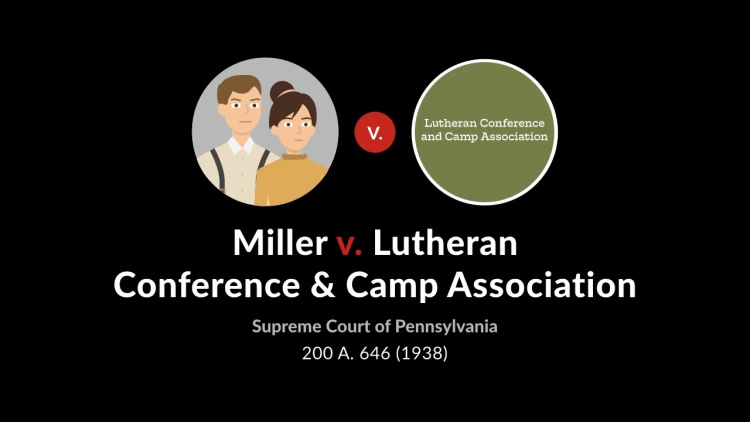Miller v. Lutheran Conference & Camp Association
Pennsylvania Supreme Court
331 Pa. 241, 200 A. 646 (1938)
- Written by Rocco Sainato, JD
Facts
Frank Miller (plaintiff), his brother, Rufus Miller, and others created a corporation to build an artificial lake. The corporation granted to Frank Miller, his heirs, and his assigns by deed the exclusive right to fish and boat on all the waters of the lake. Frank and Rufus also created a partnership to build and operate boat and bath houses. Frank granted Rufus a one-fourth interest in the fishing, boating, and bathing rights. After Rufus died, his heirs began to grant licenses to lakefront property. One such license, given to Lutheran Conference & Camp Association (Lutheran) (defendant), permitted Lutheran to boat, bathe, and fish in the lake. Frank sought an injunction to stop Lutheran from using the water for bathing purposes. Frank argued that he never actually had the ability to transfer bathing rights to Miller because the bathing rights remained in the corporation’s possession. Frank argued in the alternative that even if Frank had the bathing rights, then the boating, bathing, and fishing privileges were indivisible easements in gross, so Frank could not grant a one-fourth interest to Rufus. Thus, Frank argued the bathing rights never transferred to Miller or subsequently to Lutheran. Lutheran countered that Frank and Rufus acquired the bathing rights by prescription, which allowed the rights to be divisible. The lower court issued Frank’s injunction against Lutheran.
Rule of Law
Issue
Holding and Reasoning (Stern, J.)
What to do next…
Here's why 907,000 law students have relied on our case briefs:
- Written by law professors and practitioners, not other law students. 47,100 briefs, keyed to 996 casebooks. Top-notch customer support.
- The right amount of information, includes the facts, issues, rule of law, holding and reasoning, and any concurrences and dissents.
- Access in your classes, works on your mobile and tablet. Massive library of related video lessons and high quality multiple-choice questions.
- Easy to use, uniform format for every case brief. Written in plain English, not in legalese. Our briefs summarize and simplify; they don’t just repeat the court’s language.





